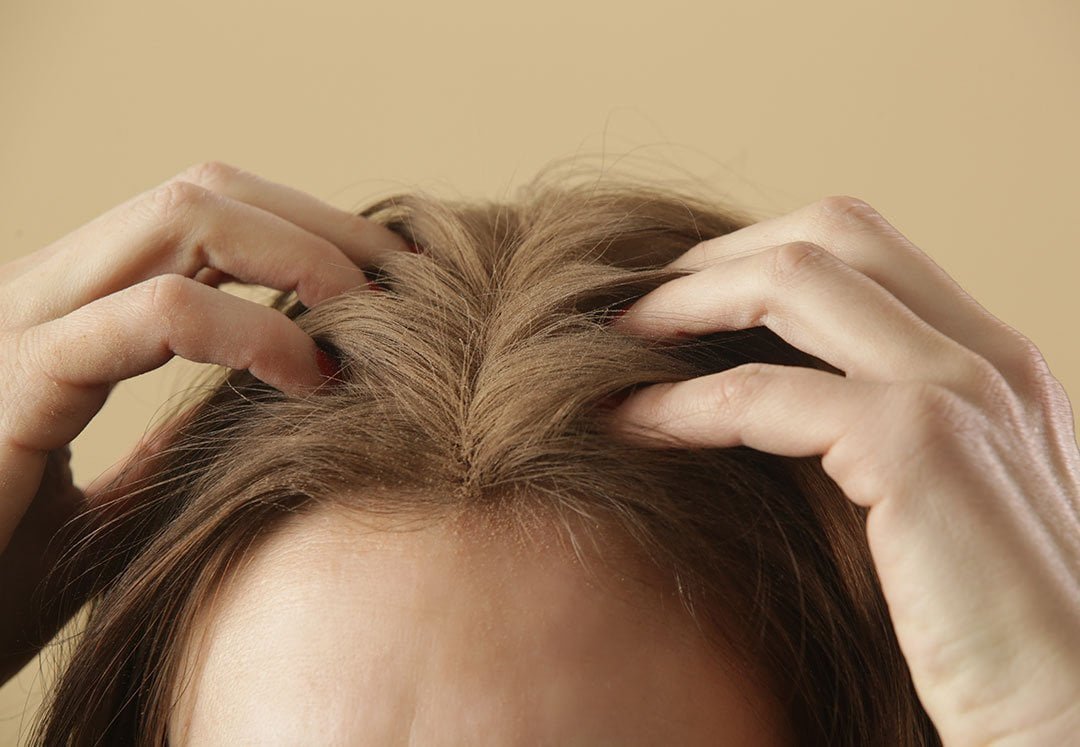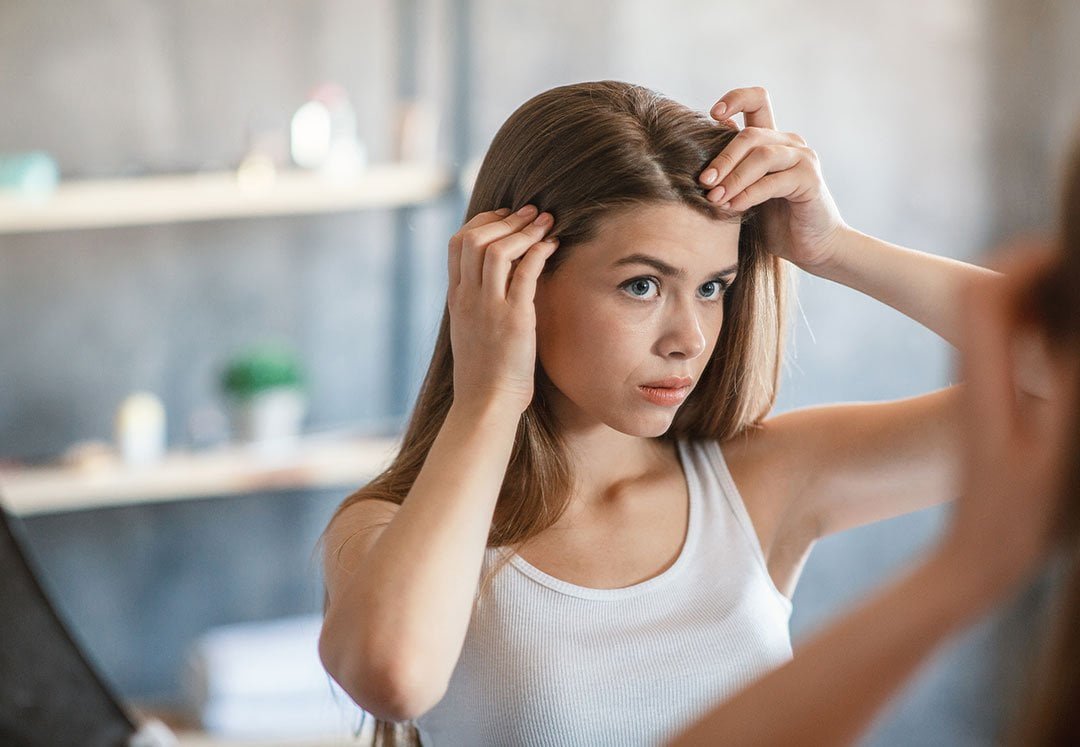Table of Contents
Dry scalp is a common condition that can be caused by a variety of factors. One of the main causes of dry scalp is the lack of moisture in the skin. This can be due to a variety of reasons, including cold weather, excessive washing with harsh shampoos, or using hot water when washing the hair. Additionally, certain skin conditions such as eczema or psoriasis can also contribute to dry scalp. Another common cause of dry scalp is the overproduction of oil, which can lead to flakiness and irritation. This can be caused by hormonal imbalances, stress, or even genetics. Furthermore, using hair products that contain harsh chemicals or alcohol can strip the scalp of its natural oils, leading to dryness and irritation.
In addition to external factors, internal factors such as diet and hydration can also play a role in the development of dry scalp. A diet lacking in essential nutrients such as vitamins A, D, and E, as well as omega-3 fatty acids, can contribute to dry scalp. Dehydration can also lead to dry scalp, as the skin needs adequate hydration to maintain its moisture balance. Understanding the causes of dry scalp is crucial in finding the right treatment and prevention methods.
Key Takeaways
- Dry scalp can be caused by factors such as harsh hair products, weather conditions, and skin conditions like eczema or psoriasis.
- Look for products with moisturizing ingredients like coconut oil, shea butter, or glycerin to treat dry scalp.
- Natural remedies like tea tree oil, aloe vera, and apple cider vinegar can provide relief for dry scalp.
- Severe dry scalp may require professional treatments such as medicated shampoos, steroid creams, or light therapy.
- Lifestyle changes like reducing stress, staying hydrated, and eating a balanced diet can improve scalp health.
Choosing the Right Products for Dry Scalp Treatment
When it comes to treating dry scalp, choosing the right products is essential for achieving relief and preventing further irritation. Look for shampoos and conditioners that are specifically formulated for dry scalp, as these products are designed to provide extra moisture and nourishment to the scalp. Avoid products that contain harsh chemicals such as sulfates and parabens, as these can further strip the scalp of its natural oils and exacerbate dryness. Instead, opt for gentle, natural ingredients such as coconut oil, argan oil, and aloe vera, which are known for their moisturizing and soothing properties.
In addition to choosing the right shampoo and conditioner, incorporating a scalp treatment into your hair care routine can also help alleviate dry scalp. Look for products that contain ingredients such as tea tree oil, witch hazel, or salicylic acid, which can help exfoliate the scalp and reduce flakiness. It’s important to note that everyone’s scalp is different, so it may take some trial and error to find the products that work best for you. Consulting with a dermatologist or trichologist can also provide valuable insight into which products are best suited for your specific scalp needs.
Natural Remedies for Dry Scalp Relief
In addition to using specialized products, there are several natural remedies that can provide relief for dry scalp. One of the most popular natural remedies is coconut oil, which is known for its moisturizing and antibacterial properties. Simply warm up the coconut oil and massage it into the scalp, leaving it on for at least 30 minutes before washing it out. Another natural remedy is apple cider vinegar, which can help restore the pH balance of the scalp and reduce itchiness. Mix equal parts water and apple cider vinegar and apply it to the scalp before shampooing.
Aloe vera is another natural ingredient that can provide relief for dry scalp. Its soothing and hydrating properties can help reduce inflammation and irritation. Simply apply aloe vera gel directly to the scalp and leave it on for 15-20 minutes before rinsing it out. Additionally, incorporating essential oils such as tea tree oil, lavender oil, or peppermint oil into your hair care routine can also help alleviate dry scalp. These oils have antimicrobial and anti-inflammatory properties that can help soothe the scalp and reduce flakiness. When using essential oils, it’s important to dilute them with a carrier oil such as coconut oil or jojoba oil to avoid irritation.
Professional Treatments for Severe Dry Scalp
| Treatment Type | Description | Frequency |
|---|---|---|
| Scalp Exfoliation | Removes dead skin cells and product buildup from the scalp | Once a week |
| Hydrating Hair Masks | Provides deep hydration to the scalp and hair | Once a week |
| Professional Scalp Treatment | Customized treatment for severe dry scalp by a professional | As recommended by the professional |
| Moisturizing Shampoos | Gently cleanses the scalp while adding moisture | Regular use |
For individuals with severe or persistent dry scalp, seeking professional treatments from a dermatologist or trichologist may be necessary. One common professional treatment for dry scalp is corticosteroid injections, which can help reduce inflammation and itching associated with conditions such as eczema or psoriasis. These injections are typically administered directly into the affected areas of the scalp and can provide relief for several weeks.
Another professional treatment option is phototherapy, which involves exposing the scalp to ultraviolet light to reduce inflammation and slow down the growth of skin cells. This treatment is often used for individuals with moderate to severe psoriasis or eczema on the scalp. Additionally, professional scalp treatments such as exfoliating scrubs or chemical peels can help remove dead skin cells and promote healthy skin regeneration. These treatments are typically performed in a dermatologist’s office and can provide immediate relief for severe dry scalp.
Lifestyle Changes to Improve Scalp Health
In addition to using the right products and treatments, making lifestyle changes can also improve overall scalp health. One important lifestyle change is to avoid overwashing the hair, as this can strip the scalp of its natural oils and lead to dryness. Instead, aim to wash your hair no more than 2-3 times per week, using lukewarm water and gentle shampoos.
Another lifestyle change is to incorporate a balanced diet rich in essential nutrients such as vitamins A, D, and E, as well as omega-3 fatty acids. These nutrients are crucial for maintaining healthy skin and can help prevent dry scalp. Additionally, staying hydrated by drinking plenty of water throughout the day can also help maintain moisture balance in the skin.
Reducing stress through relaxation techniques such as meditation, yoga, or deep breathing exercises can also benefit scalp health. Stress has been linked to hormonal imbalances that can contribute to overproduction of oil and dryness on the scalp. By incorporating stress-reducing activities into your daily routine, you can help improve overall scalp health.
Tips for Maintaining a Healthy Scalp

Once you’ve found relief for your dry scalp, it’s important to maintain a healthy scalp to prevent future flare-ups. One tip for maintaining a healthy scalp is to regularly exfoliate the skin using a gentle scrub or brush. This can help remove dead skin cells and prevent buildup on the scalp.
Another tip is to protect your scalp from environmental factors such as sun exposure and cold weather. Wearing a hat or using sunscreen on your scalp when spending time outdoors can help prevent damage and dryness.
Additionally, avoiding heat styling tools such as flat irons and blow dryers can also benefit scalp health. The excessive heat from these tools can strip the scalp of its natural oils and lead to dryness and irritation.
Finally, scheduling regular appointments with a dermatologist or trichologist for scalp check-ups can help catch any potential issues early on and prevent them from worsening.
Seeking Professional Help for Persistent Dry Scalp Issues
If you’ve tried various home remedies and over-the-counter treatments for dry scalp with no relief, it may be time to seek professional help from a dermatologist or trichologist. These specialists can provide a thorough evaluation of your scalp condition and recommend personalized treatment options based on your specific needs.
In some cases, persistent dry scalp may be a symptom of an underlying medical condition such as eczema, psoriasis, or seborrheic dermatitis. A professional evaluation can help identify any potential underlying causes and provide targeted treatment options.
Additionally, if you experience persistent itching, redness, or flakiness on the scalp despite using over-the-counter treatments, it’s important to seek professional help. These symptoms could be indicative of a more serious skin condition that requires medical intervention.
Overall, seeking professional help for persistent dry scalp issues is crucial for finding long-term relief and preventing further discomfort. A dermatologist or trichologist can provide expert guidance and personalized treatment options to address your specific scalp needs.
In conclusion, understanding the causes of dry scalp is essential in finding effective treatment options. Choosing the right products, incorporating natural remedies, seeking professional treatments when necessary, making lifestyle changes, maintaining a healthy scalp, and seeking professional help when needed are all important steps in managing dry scalp effectively. By taking a comprehensive approach to scalp care, individuals can find relief from dryness and irritation while promoting overall scalp health.
If you’re struggling with a dry scalp, it’s essential to find the right scalp treatment to restore moisture and balance. In a recent article on Hair by Molly G, they discuss natural remedies and tips for dealing with hair loss and promoting hair regrowth. Understanding the importance of scalp health and finding effective treatments can make a significant difference in maintaining healthy, beautiful hair.
FAQs
What causes dry scalp?
Dry scalp can be caused by a variety of factors, including cold weather, excessive washing or use of harsh hair products, dehydration, and certain skin conditions such as eczema or psoriasis.
What are the symptoms of dry scalp?
Symptoms of dry scalp can include itching, flaking, redness, and a feeling of tightness or dryness on the scalp.
How can scalp treatment help with dry scalp?
Scalp treatment for dry scalp can help to moisturize and nourish the scalp, reduce itching and flaking, and promote a healthier scalp environment.
What are some common ingredients in scalp treatments for dry scalp?
Common ingredients in scalp treatments for dry scalp include moisturizing agents such as coconut oil, shea butter, and argan oil, as well as soothing ingredients like aloe vera and tea tree oil.
How often should scalp treatment be used for dry scalp?
The frequency of scalp treatment for dry scalp can vary depending on the severity of the condition and the specific product being used. It is generally recommended to use scalp treatment as needed to maintain a healthy scalp.
Are there any lifestyle changes that can help with dry scalp?
In addition to using scalp treatment, lifestyle changes such as drinking plenty of water, avoiding excessive heat styling, and using a gentle shampoo can help to improve dry scalp.
Our Beauty salon Hair by Molly is based proudly in Mission Texas 2614 E Griffin Pkwy Suite A, Mission, TX 78572. Book an appointment today by calling at 956-887-2297 or click here for a free hair consultation. Dont forget to follow us in our social media channels Instagram and Facebook and check our reviews on Google My Business. We eagerly await hearing from you soon!




